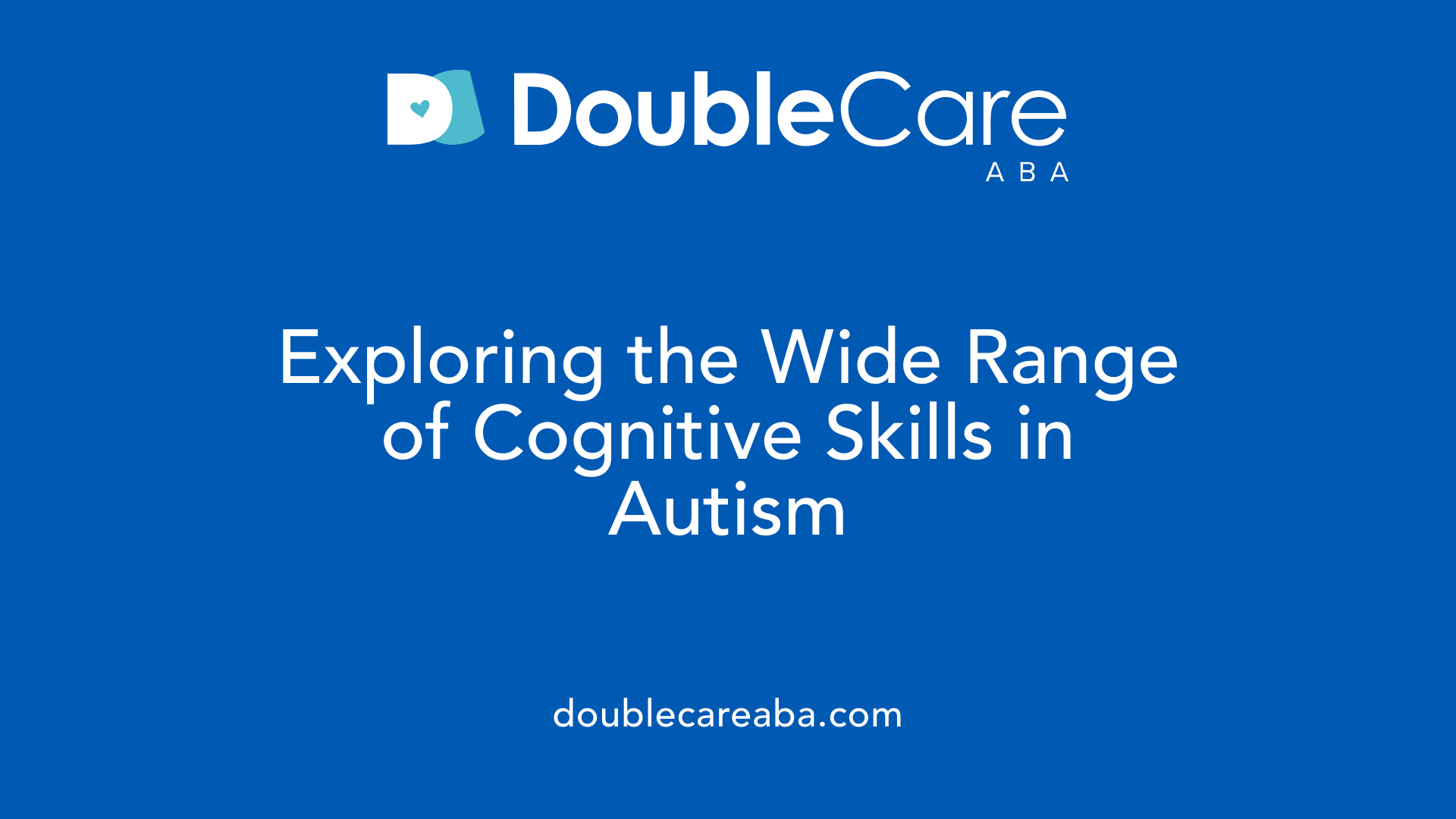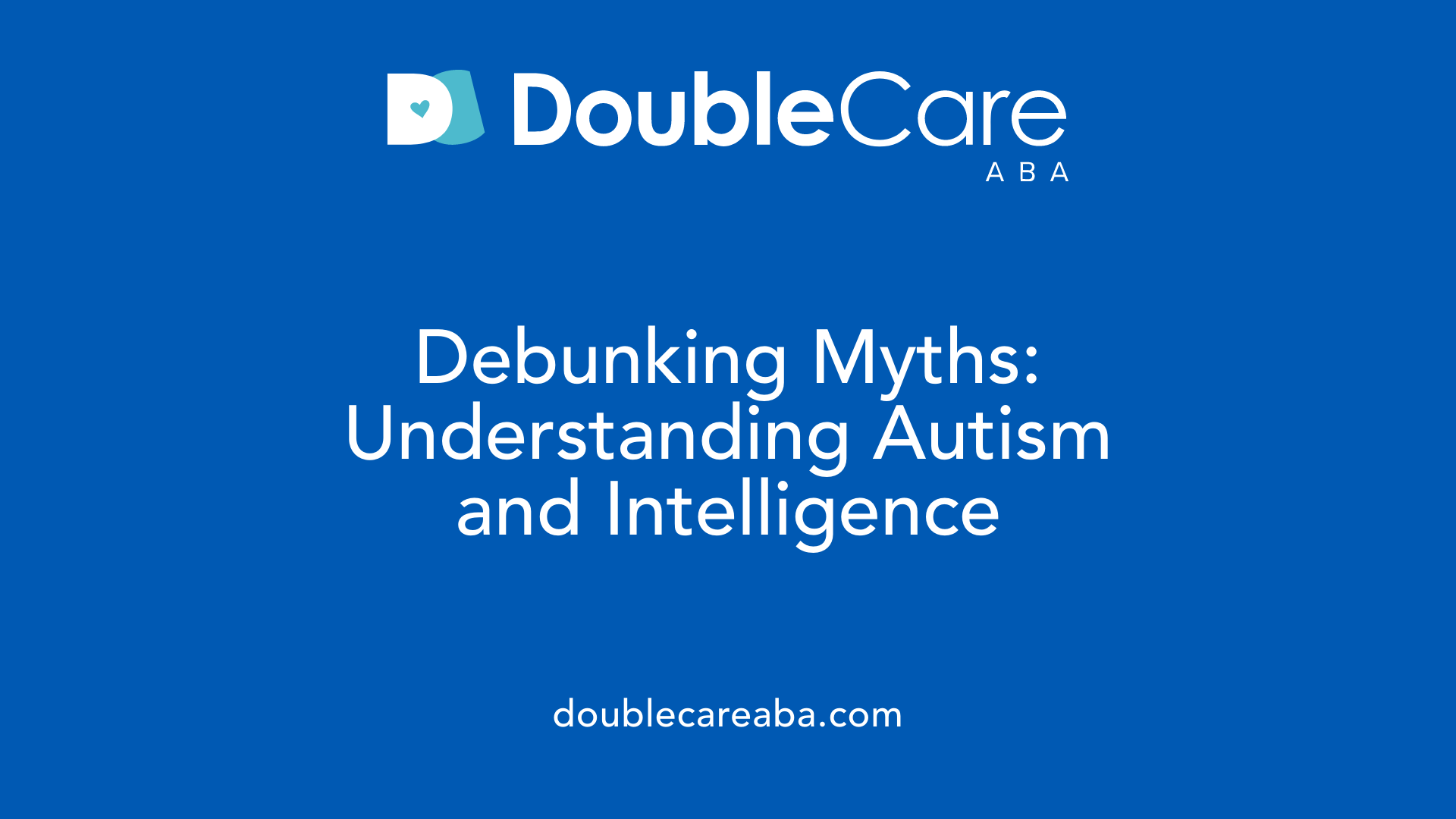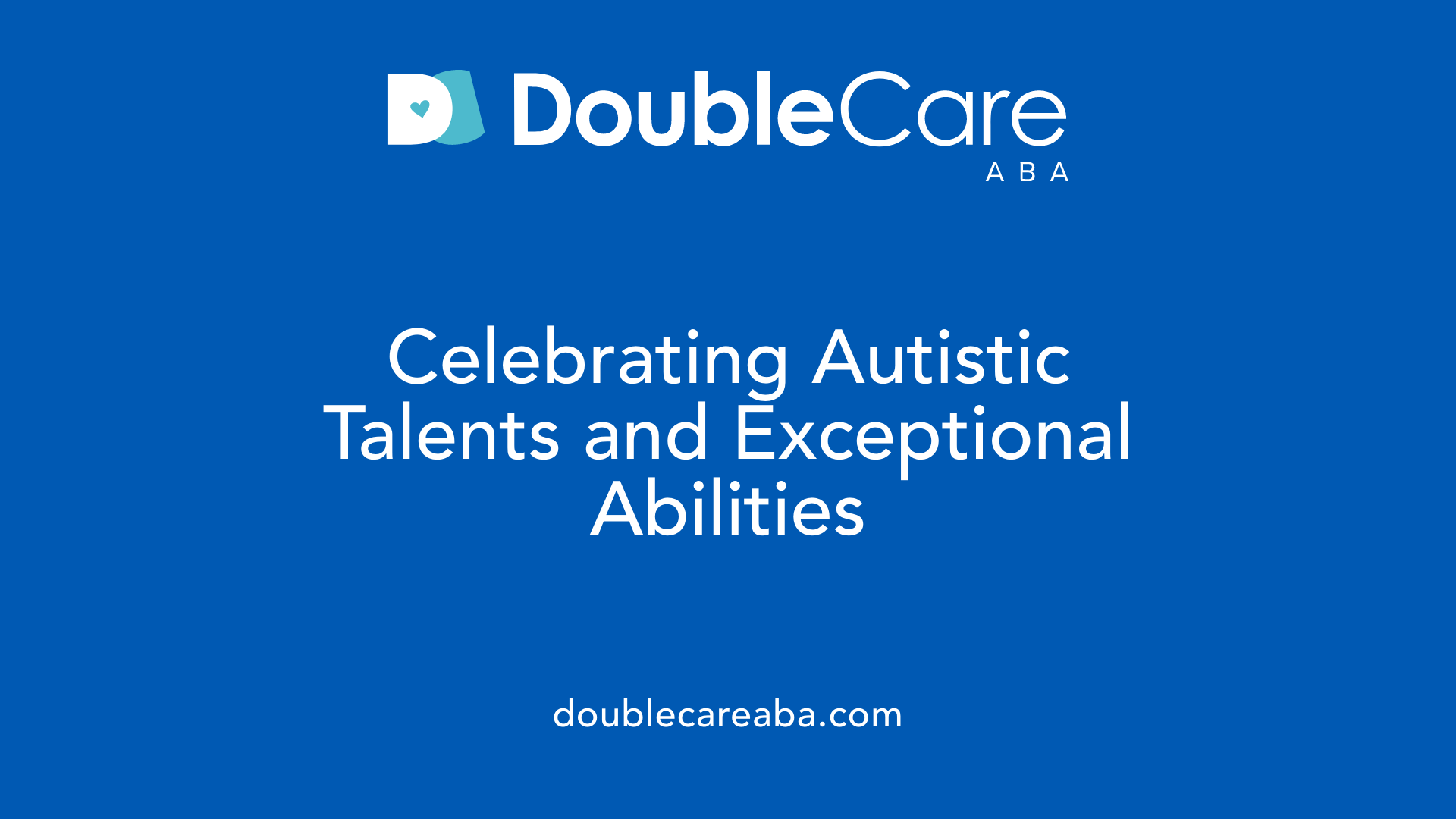Understanding Intelligence and Autism: Myths and Realities
Autism spectrum disorder (ASD) encompasses a broad range of cognitive abilities, from intellectual disabilities to giftedness. Despite popular misconceptions, autism does not inherently determine intelligence. This article explores the scientific insights into the diverse intellectual capacities of autistic individuals, challenging myths and shedding light on their unique strengths.
Diversity of Cognitive Abilities within the Autism Spectrum

Do autistic individuals have a wide range of cognitive abilities?
Autistic individuals exhibit a broad spectrum of cognitive capabilities, ranging from significant challenges to above-average or even exceptional intelligence. Some children with ASD may face difficulties with sensory processing, memory, or language, which can impact their learning and daily functioning. Conversely, many autistic children demonstrate high-functioning skills, such as intense focus, exceptional memory, visual learning strengths, or unique problem-solving approaches.
This diversity stems from various neurobiological factors, including differences in brain connectivity, immune function, and developmental trajectories. For example, some individuals may experience delayed language development but later develop advanced reasoning skills.
Assessment of cognitive abilities in ASD often reveals that, despite potential language delays or communication hurdles, many individuals possess substantial cognitive skills. These skills are sometimes underestimated, as traditional tests may not adequately capture an individual's potential or specific strengths.
Ultimately, autism spectrum disorder represents a wide range of cognitive profiles, illustrating the importance of personalized approaches to diagnosis and support.
What is the typical range of IQ scores among individuals with ASD?
The IQ distribution within the ASD community is notably varied. Historically, a large proportion of individuals with autism were thought to have intellectual disabilities, with IQs below 70. However, recent studies indicate a shift, with nearly half of individuals with ASD now showing average or above-average IQ scores.
Several factors influence this trend, including broader diagnostic criteria that encompass more high-functioning individuals, differences in study methodologies, and improved assessment tools. For example, some recent research shows that a significant portion of the autistic population has IQ scores within the normal or superior range.
It’s also important to note that assessments might not always fully reflect the abilities of individuals with high IQs. Standardized tests may underestimate their intelligence, especially if they have strengths in areas not tested or face challenges in language or executive functioning.
In summary, the IQ spectrum among those with ASD is extensive, underscoring that autism includes individuals from intellectual disabilities to highly gifted.
| Aspect | Observations | Additional Details |
|---|---|---|
| IQ range in ASD | Wide, from below 70 to above 130 | Influenced by diagnostic criteria, assessment tools, and sampling methods |
| Prevalence of high IQ | Increasing in recent years, now up to ~50% | Reflects broader diagnosis spectrum and better recognition of high-functioning ASD |
| Assessment challenges | Standard tests may underestimate some abilities | Need for tailored testing that captures strengths in visual, memory, or creative domains |
| Heterogeneity factors | Brain connectivity, genetic influences, developmental trajectories | Variability explains diverse cognitive profiles across individuals with ASD |
Impact of assessment tools and diagnostic practices
The measurement of intelligence in individuals with autism is complicated by limitations in traditional IQ tests. Standardized assessments, while useful, are sometimes less accurate for autistic individuals, particularly those with higher functioning levels.
Children and adults with autism may perform inconsistently on cognitive tests due to sensory sensitivities, language issues, or executive functioning challenges. This can lead to underestimation of their true abilities.
Changing diagnostic criteria and broadened definitions of ASD have also affected how individuals are assessed and classified cognitively. Some individuals previously not diagnosed with autism may now be included, influencing the overall understanding of IQ distribution.
Furthermore, variability in study methodologies and sample selection biases contribute to differing reports on cognitive levels within the spectrum. For instance, research focusing on clinical settings might overrepresent lower-functioning individuals, while community-based studies can highlight higher IQ profiles.
There is an ongoing need for more nuanced and comprehensive evaluation tools that consider the unique strengths and challenges of autistic individuals. Such tools can better inform intervention strategies and support systems tailored to diverse cognitive profiles.
| Challenge/Factor | Effect on IQ Measurement | Suggested Improvements |
|---|---|---|
| Limitations of traditional tests | Underestimation of abilities, especially in visual or memory skills | Develop autism-sensitive assessments, incorporate alternative testing methods |
| Diagnostic changes over time | Broader inclusion, shifting IQ distribution data | Adjust interpretations based on diagnostic context |
| Sample biases | Overrepresentation of certain groups, skewing results | Use diverse, representative samples in research |
| Developmental variability | Different trajectories can affect IQ scores over time | Longitudinal studies to understand cognitive changes throughout life |
This knowledge underscores the importance of individualized assessment strategies and highlights the diversity in the cognitive spectrum among people with autism.
Common Misconceptions About Intelligence in Autism

What are common misconceptions about intelligence in autistic individuals?
A widespread false belief is that all autistic individuals are less intelligent or have below-average cognitive abilities. In reality, autism spectrum disorder (ASD) encompasses a broad range of cognitive profiles. Many autistic people demonstrate high intelligence, specialized skills, and exceptional memory.
Another misconception is that autism is inherently linked to savant-like genius abilities. While some autistic individuals are savants, possessing extraordinary talents in fields such as mathematics, music, or art, these cases are rare and do not represent the majority.
Standard IQ tests often underestimate the abilities of autistic individuals. Factors like differences in communication, processing speed, and educational background can influence test scores, making them less reliable indicators of true intelligence.
Overall, autism’s wide spectrum of cognitive functioning means that some individuals face intellectual challenges, while others excel academically or in specific skill areas. Recognizing this diversity is crucial to understanding the true relationship between autism and intelligence.
Does autism affect IQ scores?
Autism Spectrum Disorder does not have a uniform impact on IQ scores. Earlier research suggested that a significant portion of individuals with ASD had intellectual disabilities, with estimates around 70%. However, recent studies show a different picture.
Current data indicates that approximately 30% of people with ASD have an IQ below 70, but the remaining 70% have average or above-average IQs. Some reports suggest that up to 59% of autistic individuals are in the typical or gifted range.
Several factors influence these measurements. Variability in testing methods, age, diagnostic criteria, and individual differences all complicate the picture. For example, traditional IQ tests may not fully capture the talents and abilities of autistic individuals, especially those with high intelligence.
Additionally, the diagnostic expansion of ASD and changing classification methods over time have influenced the observed distribution of cognitive abilities. Some high-functioning autistic individuals may be underestimated or misdiagnosed.
In summary, autism does not determine IQ positively or negatively. Instead, the spectrum includes individuals across the entire range of intellectual capabilities, emphasizing the importance of personalized assessment over assumptions.
Autistic Strengths and Exceptional Skills

Are some autistic individuals considered highly intelligent?
Many people with autism spectrum disorder (ASD) demonstrate remarkable abilities that often seem extraordinary. They excel in areas such as memory, pattern recognition, visual thinking, and logical reasoning. These strengths can lead to deep mastery in their chosen fields, especially when they focus intensely on particular interests.
Autistic individuals frequently develop expertise in specific areas, including mathematics, sciences, arts, and technology. Their heightened attention to detail, hyperfocus, and unique perspectives allow them to approach problems creatively and systematically.
While not all autistic individuals are highly intelligent by traditional IQ tests, many exhibit cognitive strengths that surpass typical expectations. These abilities can manifest as skills in music, art, memory, or systematic thinking. Traits like early reading skills (hyperlexia), intense focus, and a strong sense of justice further showcase their diverse and profound cognitive capabilities.
Autistic savants and their talents
A small percentage of individuals on the spectrum qualify as autistic savants—persons with extraordinary talents in specific domains such as mathematics, music, or art. These talents often involve exceptional skills in pattern recognition, memory, or spatial reasoning.
Savant skills have captured public imagination, but they represent a minority within the ASD community. Nevertheless, their existence highlights the potential for specific neural specializations in autism, which can lead to bursts of genius in selected areas.
Special interests leading to expertise
Another distinctive feature among many autistic children is their intense focus on particular interests. These passions often become the foundation for acquiring sophisticated knowledge and skills.
For example, a child deeply engaged in trains might learn extensive details about railway systems, engineering, and history. Over time, this focused learning can translate into high-level expertise, sometimes even leading to professional achievements.
This phenomenon underscores how intense interests can serve as pathways to developing talents that might otherwise go unnoticed in typical educational settings.
| Area of Skill | Description | Examples and Impact |
|---|---|---|
| Memory | Exceptional ability to recall facts, images, or sequences | Memorizing complex data, early reading skills |
| Pattern Recognition | Spotting regularities and connections quickly | Code breaking, chess mastery, data analysis |
| Visual Thinking | Strong visual-spatial skills | Artistic creation, engineering, scientific visualization |
| Special Interests | Deep engagement with specific topics | Expertise in hobbies, academic fields, career specialization |
| Savant Skills | Rare, extraordinary talents in narrow domains | Advanced mathematics, musical composition |
Understanding intelligence in autism distribution
Despite the popular myth that all autistic individuals are extraordinarily intelligent, research suggests otherwise. The spectrum is highly heterogeneous—some individuals have intellectual disabilities, others are average, and a notable number are highly gifted.
Recent epidemiological studies demonstrate shifts over time, with a decreasing percentage of individuals with ASD having significant intellectual disabilities. Diagnostic practices and broadened criteria contribute to the observed diversity.
Assessment limitations can sometimes underestimate abilities, particularly in individuals with high IQs who may find standard tests less suitable. Consequently, understanding of autistic intelligence is nuanced, requiring a comprehensive view of strengths, challenges, and developmental trajectories.
Genetic and neurobiological aspects of intelligence in autism
Research indicates a genetic connection between autism and higher intelligence. Some genes associated with autism also relate to increased cognitive abilities in the general population.
Brain development differences, including early rapid growth and cortical thinning, appear linked to enhanced skills in certain domains. Variations in brain structure, neuron firing rates, and neural connectivity underlie many of these exceptional abilities.
Overall, a combination of genetics, brain architecture, and focused interests contributes to the spectrum of intelligence observed among autistic individuals.
| Topic | Details | Notes |
|---|---|---|
| Prevalence of Giftedness | Some autistic individuals are identified as gifted | Often underestimated in standard IQ tests |
| Neurobiological Factors | Differences in brain growth and connectivity | Contribute to exceptional skills |
| Genetic Links | Genes associated with higher intelligence are linked to ASD | Overlap suggests shared pathways |
| Developmental Trajectories | High IQ individuals may show diverse developmental paths | Some improve over time, others remain stable or worsen |
Understanding the diversity of intelligence within autism helps dispel myths and highlights the unique profiles each individual possesses, emphasizing the importance of personalized approaches in education, therapy, and support.
Neurobiological and Genetic Perspectives on Intelligence in Autism

Is there a biological basis for high intelligence in some autistic individuals?
Many researchers believe that certain biological factors support the possibility of high intelligence in some people on the autism spectrum. Studies point to differences in brain development, such as rapid early cortical growth followed by cortical thinning, which are associated with enhanced cognitive abilities.
Additionally, genetic research shows significant links between genes associated with autism and those related to higher intelligence. This indicates that some genetic pathways may influence both traits concurrently.
Neuroscientific investigations into neuronal firing rates and brain structure reveal that autistic individuals might have unique neurobiological mechanisms. These mechanisms include atypical brain connectivity and localized processing advantages. Such differences can foster advanced skills in problem-solving, memory, and pattern recognition, contributing to extraordinary cognitive talents in some cases.
These biological insights help explain why a subset of autistic individuals demonstrates intellectual abilities that stand out compared to neurotypical populations.
The Role of Autism Research and Future Directions

What is the impact of evolving diagnostic criteria on understanding intelligence in autism?
Recent changes in how autism spectrum disorder (ASD) is diagnosed have significantly influenced our view of cognitive abilities within the spectrum. Historically, ASD was categorized into specific subtypes, often associated with distinct cognitive profiles. Today, the move toward recognizing autism as a spectrum broadens this perspective, revealing considerable variability in intellectual functioning among individuals.
This shift allows clinicians to identify and support a wider range of cognitive abilities. It also emphasizes that high intelligence and giftedness are more common in some individuals on the spectrum than previously thought. As a result, diagnostic frameworks now better reflect the true heterogeneity of autism, making it clear that intelligence levels can range from intellectual disabilities to above-average and gifted capabilities.
However, these diagnostic evolutions also affect how IQ scores are interpreted. They contribute to a growing recognition that a simple label cannot fully capture an individual’s intellectual potential. This highlights the importance of using assessment tools tailored to reflect the diverse cognitive profiles seen in ASD.
Why is there a need for specialized tools to assess intelligence in autistic individuals?
Standard IQ tests might not fully capture the intelligence of autistic individuals, particularly those with high abilities. Factors such as unique communication styles, sensory sensitivities, and distinct learning preferences can affect how autistic individuals perform on traditional assessments.
Atypical responses and processing styles may lead to an underestimation of their true potential. Therefore, developing specialized evaluation tools that consider neurodiversity is essential. These tools should account for sensory sensitivities, language differences, and special learning traits.
Implementing tailored assessments would help accurately identify cognitive strengths and challenges. This, in turn, ensures that autistic individuals receive appropriate educational support and recognition. For those with high IQs, such tools are crucial to demonstrating their capabilities and providing opportunities aligned with their potential.
How do developmental trajectories influence cognitive abilities in autism?
Cognitive development in autism varies widely. Some individuals show notable improvements over time, especially with early intervention, supportive environments, and adequate resources.
For example, children with higher IQs often demonstrate progress in language, social skills, and problem-solving as they grow older. These positive trajectories can lead to greater independence and success in academic and social domains.
Conversely, other individuals may experience stable or worsening challenges, depending on genetic factors, neurobiological differences, and external support. If intervention and environmental factors are limited, some may face persistent difficulties.
Understanding these diverse developmental paths enables clinicians, educators, and families to tailor interventions that suit each person’s unique needs. Recognizing that some individuals can improve significantly over time offers hope and underscores the value of early, targeted support.
| Aspect | Variability | Impact | Examples |
|---|---|---|---|
| IQ range | From intellectual disability to giftedness | Affects educational strategies and expectations | Gifted autistic children exhibiting advanced problem-solving |
| Developmental changes | Some show improvement; others remain stable | Guides intervention planning | Early language development in high-IQ children |
| Influencing factors | Genetics, environment, early support | Can alter cognitive outcomes | Early speech therapy and tailored education |
Understanding and embracing the diversity of cognitive development in autism fosters an environment where each individual’s unique strengths are recognized and nurtured.
Concluding Insights and Implications for Society
What are the key takeaways about intelligence in autistic individuals?
Autism spectrum disorder (ASD) is a vast and varied condition, encompassing a wide range of cognitive abilities. While some individuals with autism face intellectual challenges or disabilities, many others exhibit remarkable strengths and talents, which can include exceptional skills in specific domains, extraordinary memory, intense focus, and unique perspectives. Around 30% of those with ASD are believed to possess outstanding skills in particular areas, such as mathematics, music, or visual arts, often categorized as savant abilities.
Contrary to popular myths, autism does not universally equate to high intelligence. Scientific studies have not established a firm link between exceptional cognition and autism. In fact, some research shows that individuals with ASD tend to score lower on measures of IQ, verbal comprehension, perception, and processing speed compared to neurotypical controls. Autism presents as a heterogenous condition, with variability in IQ and cognitive functioning across individuals.
Understanding this wide spectrum of abilities underscores the importance of accurate assessments. Relying solely on standard IQ tests can sometimes underestimate the potential of autistic individuals, particularly those with above-average abilities. Recognizing their diverse strengths enables educators, employers, and society to better support their development and integration.
Why is it important to move beyond misconceptions regarding autism and intelligence?
Moving past simplistic and often false assumptions is crucial for creating a more inclusive society. The stereotype that all autistic individuals are less intelligent or that all are savants with extraordinary talents is misleading and ignores the real diversity within the spectrum.
By dispelling these misconceptions, society can provide tailored educational and employment opportunities that acknowledge each person’s unique abilities. Recognizing that some autistic individuals are highly intelligent and possess advanced problem-solving skills encourages a shift toward neurodiversity—valuing different ways of thinking and processing information.
This understanding also fosters a respectful attitude and reduces stigma. When society perceives autism not through a narrow lens of deficits but as a spectrum of potential, it promotes acceptance, appreciation, and support. Advocacy efforts emphasize that strengths, as well as challenges, should be acknowledged, and that ability and potential come in many forms.
Recognition of cognitive diversity in autism
Understanding that autism includes individuals with a vast range of intellectual capabilities is essential for effective advocacy and support. From intellectual disabilities to giftedness, every person's profile contributes to the rich tapestry of neurodiversity.
The ongoing research highlights genetic correlations showing some genes linked to autism are also associated with higher intelligence, and brain development differences may contribute to exceptional skills in certain domains. Appreciating this complexity encourages society to approach each autistic person as a unique individual with their own strengths and needs.
Importance of personalized assessments
Given the diversity in cognitive profiles, personalized and nuanced assessments are vital. Standardized tests can have limitations, especially in identifying high abilities among autistic individuals. Reliable, holistic evaluation methods allow for a more accurate understanding of each person’s capabilities.
Tailored assessments inform better educational strategies, employment opportunities, and social support systems. Recognizing that some autistic individuals may excel in specific fields leads to more inclusive environments that foster growth and achievement.
Advocacy for societal understanding
Promoting awareness and understanding about the true nature of autism enhances societal acceptance. Acknowledging that autism is a spectrum with a broad range of abilities—some highly gifted—helps combat stereotypes and stigma.
Celebrating neurodiversity means embracing different ways of thinking and functioning. It involves public education, policy changes, and community programs designed to showcase strengths and provide appropriate support.
In summary, embracing the diversity of cognitive abilities in autism and moving beyond outdated stereotypes are fundamental steps toward a more inclusive, understanding society. Recognizing individual potential and supporting tailored growth not only benefits autistic individuals but enriches society as a whole.
Redefining Autism and Intelligence: Embracing Diversity
In summary, understanding autism as a spectrum of diverse cognitive abilities allows society to appreciate the unique strengths and challenges of autistic individuals. While misconceptions persist, ongoing research underscores the importance of accurate assessment and personalized support. Recognizing that intelligence in autism varies widely—ranging from cognitive impairments to exceptional talents—encourages a shift towards greater acceptance, inclusion, and celebration of neurodiversity. Embracing these differences enriches our collective perspective and underscores the need to see each autistic individual beyond stereotypes.
References
- What Makes Children with Autism Exceptionally Intelligent?
- The Myth of Autism and Exceptional Intellect - NeurologyLive
- Autism Spectrum Disorder and IQ – A Complex Interplay - PMC
- Autistic Genius: Is Autism Associated with Higher Intelligence?
- Are Autistic People Smart? - Behavioral Intervention For Autism
- The Physiology of Cognition in Autism Spectrum Disorder
- Cognitive Skills of Young Children with and without Autism ...
- Neurobiology of cognitive abilities in early childhood autism













